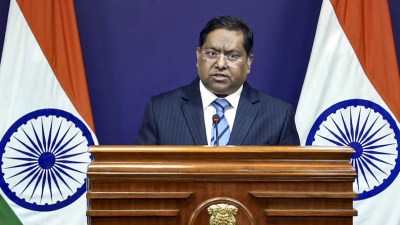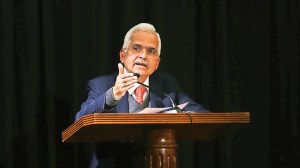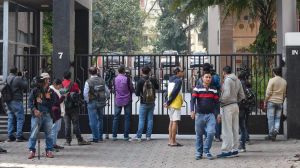Zelensky disputes Moscow’s claims of Bakhmut’s capture: Why Russia-Ukraine have been fighting over the city for months
Located in Ukraine’s Donetsk province, Bakhmut has been a site of fierce fighting between the Russian and Ukrainian forces for over nine months. It has cost thousands of lives on both sides and much of the city has turned to rubble.
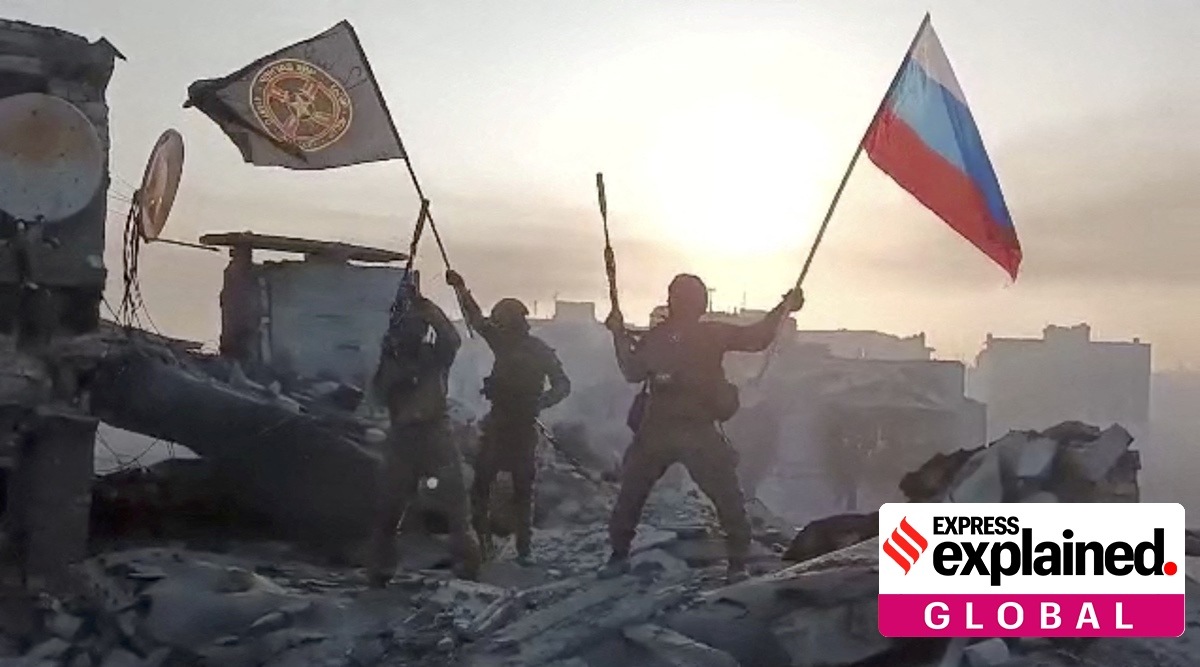 Wagner mercenary group fighters wave flags of Russia and Wagner group on top of a building in an unidentified location, in the course of the Russia-Ukraine conflict, in this still image obtained from a video released on May 20, 2023, along with a statement by Russian mercenary chief Yevgeny Prigozhin about taking full control of the Ukrainian city of Bakhmut. (Photo: Press service of "Concord"/Handout via Reuters)
Wagner mercenary group fighters wave flags of Russia and Wagner group on top of a building in an unidentified location, in the course of the Russia-Ukraine conflict, in this still image obtained from a video released on May 20, 2023, along with a statement by Russian mercenary chief Yevgeny Prigozhin about taking full control of the Ukrainian city of Bakhmut. (Photo: Press service of "Concord"/Handout via Reuters) Ukraine’s President Vlodymyr Zelensky, who is currently at the G7 summit in Japan, on Sunday (May 21) denied claims of the mercenary Wagner Group and Russia that said they have captured the city of Bakhmut in Ukraine.
Responding to a reporter’s question about the status of the city, Zelensky said: “Bakhmut is not occupied by the Russian Federation as of today.” “We are not throwing people (away) to die,” he added, according to the Associated Press. The President made the comment hours after Western media outlets, such as Reuters, reported that he had “acknowledged the loss of the city”. As per the Reuters report, when he was asked if Ukraine still controls Bakhmut, Zelenskyy replied, “I think no.”
On Saturday, the Wagner Group’s head, Yevgeny Prigozhin, in a video posted on social media, announced that his fighters along with Russian forces have taken over the city. Hours later, the Russian Defence Ministry made a statement and said, “As a result of offensive actions by Wagner assault units, supported by artillery and aviation of the Southern Group of Forces, the liberation of Artyomovsk (Russian name of Bakhmut) has been completed.” President Vladimir Putin also conveyed his congratulations to his troops and the Wagner Group.
Located in Ukraine’s Donetsk province, Bakhmut has been a site of fierce fighting between the Russian and Ukrainian forces for over nine months. It has cost thousands of lives on both sides and much of the city has turned to rubble.
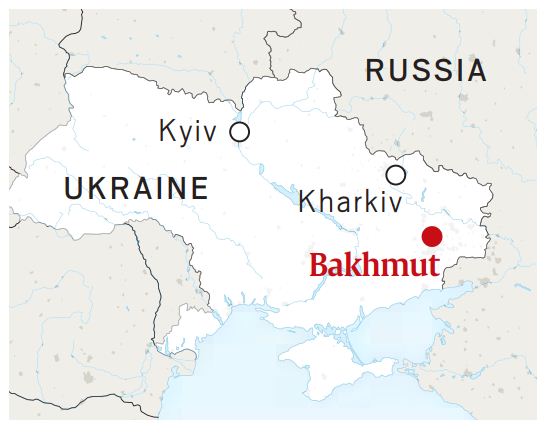 Map of Bakhmut, Ukraine.
Map of Bakhmut, Ukraine.
If Bakhmut has been captured, it’s an enormous morale boost for Russian troops as they haven’t made any significant gains since mid-2022. Ukraine, meanwhile, might have lost the city but it hopes that the prolonged battle over the city has hampered Moscow’s ability to conduct its own offensive operations, and exhausted its military and supplies.
What is the significance of Bakhmut?
Bakhmut, a small mining town in Eastern Ukraine, which had a pre-war population of 70,000-80,000 is far from being one of the “important towns” during a military invasion. It doesn’t possess any militarily important industry nor is it strategically located such that its capture is vital. At most, Bakhmut is proximate to multiple important roads which may have some strategic value to the Russian advance. But the same could be said about almost any town in the region.
Bakhmut’s significance is more symbolic than anything else. Phillips O’Brien, a professor of strategic studies at St. Andrews University in Scotland, told NPR: “It seems to have been a completely political choice [Russia considering Bakhmut an important target] on two levels. One level is they just needed a victory, that they had spent months going forward, months sending their army in this sort of winter, early spring offensive, and they hadn’t taken anything of any note.”
“But there was also, I think, politically a competitive thing within the Russian system. So it was both the overall Russian need for a victory and yet also a competitive situation within the Russian fighting forces to claim a victory. But that seems to have been it.”
For Ukrainians too, Bakhmut has been a symbol of resolve in their bid to push out Russian troops. Moreover, they began seeing the battle over the city as a way to wear down Moscow’s troops and supplies, especially ahead of their counteroffensive.
“They calculated correctly the Russians were going to sort of expend whatever it took to take Bakhmut. Bakhmut had become politically so important that if you really wanted to weaken the Russians, you had to make them fight for every block. So that’s why it’s such a horrible battle, because they really did fight building to building,” O’Brien added.
What happens now?
While Ukraine is gearing up for the counteroffensive or an offensive in summer, the Russian forces might use Bakhmut, if they have captured it, as a stepping stone to take hold of two bigger cities in the Donetsk region: Kramatorsk and Sloviansk.
According to a Reuters report published in March, Moscow needs to capture both cities to conclude what it calls its “liberation” of the “People’s Republic of Donetsk.” It also mentioned that the control of Bakhmut would help Moscow advance in the nearby town of Chasiv Yar, which is west of the city.
- 01
- 02
- 03
- 04
- 05


